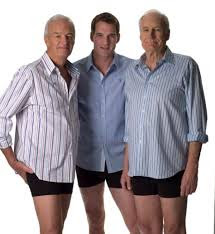Europeans sighted it first in 1642, though the Dutch navigator Abel Tasman didn't actually land. Captain Cook circumnavigated the islands in 1769, and soon European folks were exploring and living there, though not without conflict with the indigenous people.
"Mocking Australia's criminal heritage is something of a national pastime," says one source, which we found to be hilariously true, but by contrast, those who settled New Zealand came voluntarily. They were largely Englishman, with a liberal smattering of Australians coming over, and so English became the official language. Sort of.
Oh, sure, there are the usual differences that are in common with the UK. For instance, it's not polite to run around in public in "pants" in either country,
rather, you wear "trousers" when you go out.
When you say "chemist" in the US, various things come to mind, some of them not so happy.
In New Zealand or England, he or she is more likely to sell you an antacid, instead of meth.
However, it goes even further in New Zealand. It first hit us when the cheerful flight attendant greeted us with "Kia ora!" when we boarded the plane with the big fern painted on the side.
Many place names, greetings and daily words are Maori in origin. If you're told you have a nice kuru, you can be complimented (or slap the guy) for being told you have a good looking derriere. Wait, that's some other language...
The Maori tongue was actively suppressed for many years, however by some accounts over 1,000 words from that language are now in active daily use by non-native speakers, and it is taught in schools. Words like waka (technically canoe, but often used to describe any motor vehicle, kai (food), puku (belly, stomach), and whanau (family) can now be heard interspersed in everyday conversation.
Then there are some colloquialisms derived from (surprise!) the sheep industry. If you've been "pinked," it means you may get sunburned, as you've been trimmed a bit close to the skin, and such.
However, that's not all. There is a distinct accent difference, different from Australian, South African, English or whatever. This became apparent one day during our cycling adventure, when the van had to park on the grass in front of a farm to help one the riders. I was in the vehicle when the unhappy farmer confronted the guide about having stopped there.
I swear he yelled, "Bloody terrorists!"
OK, we were wearing unusual colorful Spandex clothing, helmets and weird shoes, but "terrorists?!" I don't think so! I mean, all we did was park the van on his bloody grass for about two minutes!
When I voiced my objection to our guide, she scratched her head for a moment, then said, "'TOURISTS,' not 'TERRORISTS!; TOURISTS!!"
Anyway, I was just starting to pick up the lingo when our trip ended, unfortunately.
We hope you have a tino pai day, mate!
Dave & Paula




















